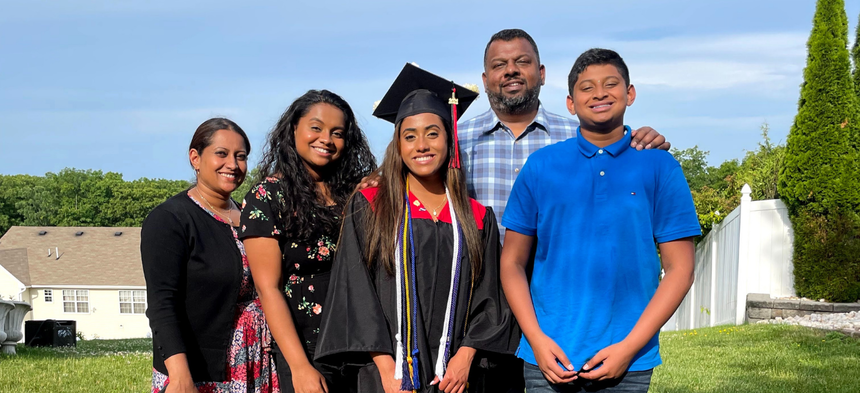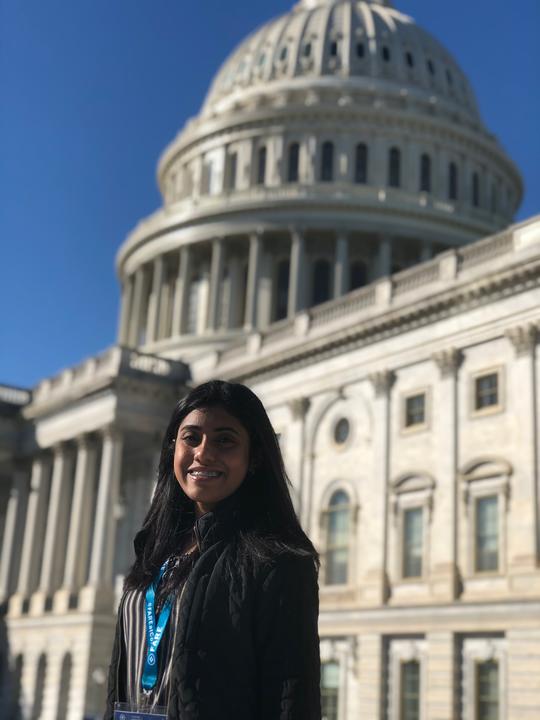FARE Leadership Spotlight - February 2022
Meet Anisah Daniel, a Teen Advisory Group member and FARE Advocate, and learn a little more about her!

- What is your name, where do you call home, and what is your food allergy connection?
My name is Anisah Daniel and I am from Jefferson Township, New Jersey. I currently attend college in Washington, D.C. as I study at George Washington University. At 6 months old, I was diagnosed with multiple severe food allergies including all nuts, dairy, egg, wheat, shellfish, chickpeas and sesame. My food allergy journey has been life-long and is ongoing.
- How did you first become involved with FARE?
I first became involved with FARE in my freshman year of high school during a food allergy awareness walk in my community. Growing up, I knew very few individuals with food allergies, which led me to feel isolation. However, this awareness walk changed my perspective as I realized that I am not alone in my food allergy experience; rather, I am part of a supportive community. This experience led to my involvement in FARE because it gave me the opportunity to make an impact within a community that I relate to.
- What is one thing you would tell any food-allergic person or parent/guardian of a food-allergic person?
I would tell any parent/guardian of a food-allergic person to support their children while empowering them to be advocates for themselves. It is instinct for food allergy parents to stand up for their children in stressful or uncomfortable situations. However, it is important to give them the opportunity to speak up for themselves. The moments that I had to speak up for myself or felt uncomfortable were the times I experienced the most growth.
- What is the best food allergy advice you ever received?
The best food allergy advice I’ve ever been given is to not let your disease define who you are. Although I was not able to share the same social experiences as my peers, my mother constantly reminded me that I should not view my disease from a perspective of self-loathing and pity, but rather, of uniqueness. This perspective has given me the confidence to be my own advocate and enjoy life despite the setback of my food allergies.
- Tell us about your experience advocating for food allergy legislation?

During FARE’s first Courage at Congress event, I had the opportunity to meet with my members of Congress. I felt prepared for these meetings as FARE gave us all the necessary materials, including a format, insightful statistics, and encouragement to share personal stories. It is the expression of personal stories that truly moved the legislators and engaged them in our conversation. They were very receptive to our “Call to Action” items and conveyed intent to co-sign the FASTER Act. It was amazing to witness my personal story being used as a vehicle for fundamental change.
- Why is it important to advocate for food allergy legislation?
It is important to advocate for food allergy legislation because changing policy is an essential component of implementing change within the food allergy community. Legislation is a catalyst for change. Breakthroughs in research can protect millions of lives, and these breakthroughs are only possible with the increased funding and resources provided by legislation. Additionally, legislation provides crucial safety measures that prevent food-allergic individuals from experiencing life-threatening allergic reactions.
- What would you tell someone who is unsure of whether to get involved in advocacy?
For anyone who is unsure about whether to get involved in advocacy, I would strongly recommend getting involved. Being an advocate has empowered me to stand up for myself and others. My motivation for being a food allergy advocate is to support those who understand my health struggle and to prevent them from undergoing the same negative experiences that I encountered as a result of ignorance. I strive to raise awareness of food allergies to ensure that non-food-allergic individuals understand its life-threatening consequences and take food allergy precautions seriously.


